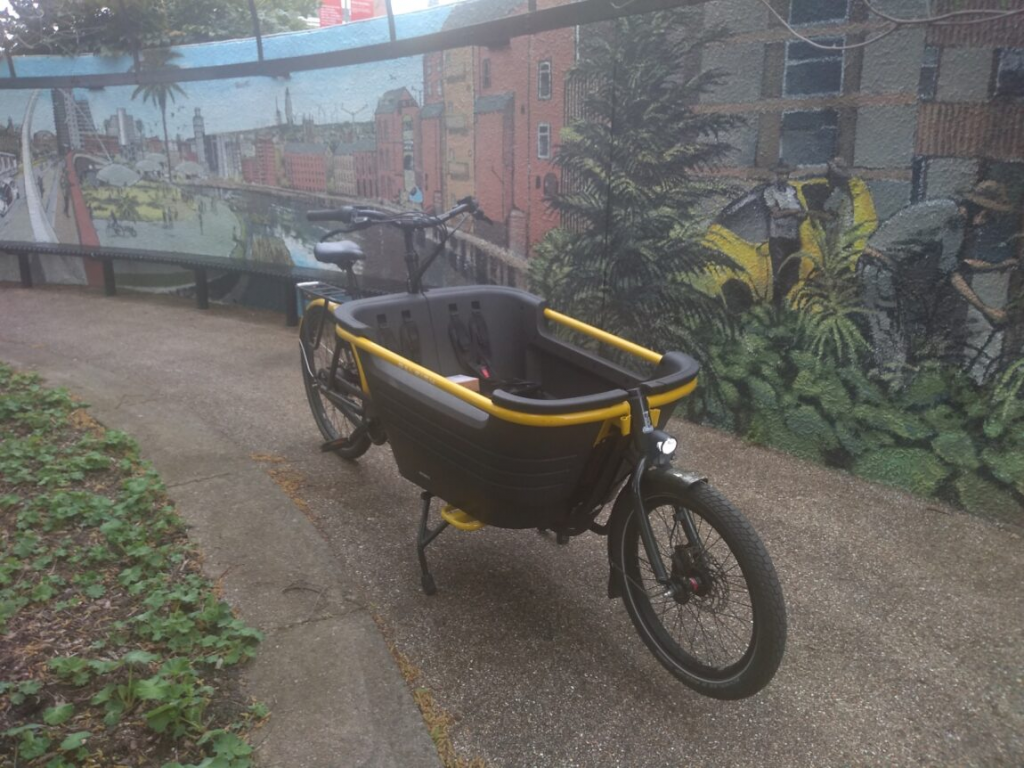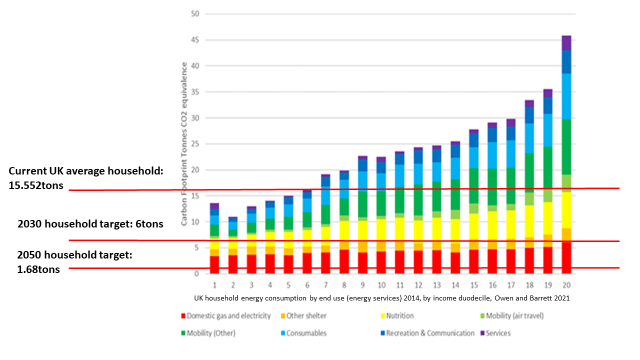
Energy consumption behaviour change: is the UK strategy of ‘leaving it to the market’ a busted flush?
Noel Cass discusses the shortcomings of the UK Government’s approach to climate policy.
An invitation from an old colleague from the DEMAND Centre allowed me to come and present to the SCI about the shortcomings of the UK Government’s approach to climate policy. I first outlined the terrifying scale of the energy consumption and demand reductions required for UK carbon emissions to meet Paris Agreement and Net Zero ambitions. While many sectors have seen impressive-looking reductions, Transport and ‘domestic’ emissions are high and at best flatlining. These have been discursively constructed as ‘household’ or ‘lifestyle’ emissions in concert with the popularity of the concept of carbon footprints – which many see as a strategic move by the fossil fuel industries to individualise responsibility for climate change. In other sectors, governments have rightly identified their role as regulating industries; decarbonising supply with renewables and forcing energy efficiencies in technologies. These approaches do not however question the nature of energy demand, how it is constituted by expectations of warmth, cleanliness, speed and convenience, and how these ‘energy services’ and needs are accomplished and satisfied in ever more energy demanding ways coupled to economic growth. In the area of everyday life and ‘energy consumption behaviour’, home heating, car driving and flying, along with carnivorous diets, remain the province of individual choice, consumer freedom and sovereignty. In the dominant culture of consumer capitalism, these are seen as sacrosanct, and policies to regulate, structurally adjust, choice edit or simply limit, budget or ban are politically taboo.

UK household energy consumption by end use (energy services) 2014, by income duodecille, Owen and Barrett 2021
I framed this reticence in terms of a research-theory-policy paradigm of behaviour change which has been the preferred mode in the area of sustainable (‘domestic’) consumption for decades. Human action, the model says, is individual utility-seeking behaviour and choice, and can be influenced in a hands-off manner through information provision and pricing. This has signally failed. Consumption studies have correctly identified that the symbolic, norm-driven, and intensely social or cultural aspects of everyday consumption have been neglected in this model. The realm of inconspicuous consumption has been opened up by Alan Warde and others and exposed as a matter of social practice, heavily shaped by societal norms and expectations, but this focus obscures the other key determinant of the energy implications of everyday life; the material infrastructures, arrangements, geographies and technologies through which people are routinely forced to satisfy their energy service needs. Rather than ‘behaviour’, energy-demanding consumption is a matter of habit, practice, and infrastructural and technological determinism. The dominant response of ‘behaviour change’ policy treats all this consumption as if it were discrete market choices, and has failed to tackle what are deeply systemic structural issues, and simultaneously the deeply ingrained cultural norms of high energy-consumption lifestyles as the very goals – the telos or teleo-affective structurings – of life in consumer capitalism. I offered Brand-Correa et al.’s ‘Order of Need Satisfiers’ theoretical framework as the one I have found most useful in explaining how these different aspects of energy-consuming behaviour fit together like cogs of a mechanical gear box: from the systems of provision through energy services and social practices, to individual technologies.
Our Excess project in the CREDS research centre collected rich empirical detail of such lifestyles in the words of those leading them. We managed to sample people whose voices are not often heard in sustainability research, those whose lives are impactful, but to them, entirely justifiable, reasonable, and desirable in a taken-for-granted way. I have published on how these lives involve unsustainable hyper-aeromobility, driven by the structural availability of tax-free jet fuel, runways and cheap flights, but also by processes of socialisation into expecting cheap international travel for work and leisure. Jet-setting work has been compounded by the internationalisation of weekend breaks, stag and hen parties, weddings, sport, birthdays, yoga retreats, and more. We also explored how all this was justified by our most hyper-aeromobile participants, and others with less energy-demanding lifestyles, through deliberative workshops. Although there was some evidence of ‘discourses of delay’, denying that climate action is necessary or desirable in ways previously identified by Lamb and colleagues, there was also evidence of discursive strategies we called discourses of inaction, involving humour, irony, the definition of wants and needs, and invoking meritocracy, luck, or both. The most important finding in all this research was probably that all of our high consumers were convinced that they were already doing everything they could possibly do to reduce their environmental impacts – and they reeled off a menu of low effort, low impact ‘behaviour changes’ that have been the explicit focus of government programmes of advice and encouragement: LED light bulbs; AA+ energy efficient devices, no matter how large or duplicated; thermostats set at ‘only’ 20 degrees; and washing dried in gardens in good weather. The photo-safaris to India, seasonal golf and ski breaks, and regular business flights all over the globe were invisible in their eyes.
At least, they were in interviews, where I was careful not to challenge or question the lifestyles they described. In deliberative workshops, when faced with those monumental reductions, high consumers along with our more ‘regular’ participants were able to discuss which policy approaches were fair, acceptable, or effective in tackling ‘excess’ consumption, and several called for restrictions on their own impacts. Taxing their multiple cars, and imposing air-mile budgets on their employers were all seen as reasonable, as was tackling multiple holiday flights before touching the occasional flights of less-well-off families or those with family abroad. It seemed that deliberative policy-making enabled people to justify tackling those policy taboos on infringing freedoms of choice. In the discussion after my presentation, some present questioned to what degree this apparent willingness was ‘real’ or could be operationalised in the current political system. The democratic deficit between public calls for more stringent state actions on the climate seen in opinion polls and deliberative events, and the success of anti-green populism in swaying the current government’s policies, seems to be unbridgeable?
I ended by revealing some first-cut findings from a current project on e-cargo bikes. The Elevate project has been lending these technological ‘solutions’ to car dependent geographies and practices (of child transport and shopping, especially) to families in three cities. Earlier I had spelt out the household costs of what the government expects by way of ‘behaviour change’ in domestic transport and heating: a £33k EV and a £10k electric heating system. This is the ‘major challenge’ implied by leaving climate policy to green consumerism and the market. Sixty-four percent of our e-cargo bike participants had a household income of £50K or more, compared to 44% of our carefully selected target suburbs and ~30% nationally. Two-thirds of them still, at the end of a month trial, cited cost as a major disincentive for their purchasing an e-cargo bike for £4-5k, and thereby reducing the cost of travel by huge amounts. A genuine, straightforward, market choice, for the disproportionately wealthy was seen as too much. What then, would the systemic or practice-focused solution be, instead?


0 Comments